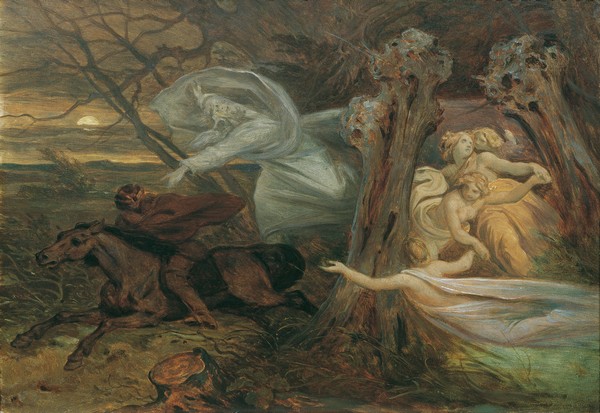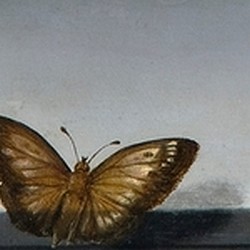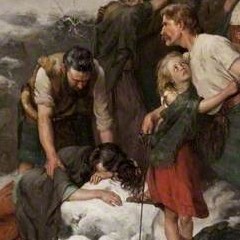
The (musical) man of the year is Ludwig van Beethoven, I think there's little doubt about it; Wherever we look, programmes in halls are full of his works. So often heard many times, that's right, but I must admit that I enjoy them greatly. Oddly enough, some parts of his work are still rather unknown. His Lieder, for example. He wrote about ninety, of which the cycle An die ferne Geliebte is virtually the only one in the repertoire. Some of them remained unpublished during Beethoven's life, they might had been composed for private concerts, and some, for instance the one we're listening this week, left unfinished.
Why have I chosen an unfinished song among such a wide catalogue? Because we're talking about Erlkönig, one of the most familiar titles for Lied lovers. The poem was written in 1782 and Beethoven put it into music in 1796; before Zelter, Goethe's favourite composer who published his version in 1808, and before Schubert, obviously, yet to be born. Beethoven's version was unfinished, and the composer Gustav Nottebohm, first investigator of the composer's work, found an sketch in the mid-19th century; Reinhold Becker completed it in 1897, a century after its composition, and thanks to them we can listen to the song, performed by baritone Paul Armin Edelmann and pianist Bernardette Bartos.
But that's not the only Erlkönig we're listening this week, also to the very first version. Goethe's poem was originally part of Der Fischerin, a libretto that he wrote during his time in Weimar. The main character, Dortchen, sings the ballad at the beginning of the play, while patching his father's fishing nets. Corona Schröter, a court singer, played this role and also composed the music of the singspiel, so she has the honour of having written the first Lied from such a famous poem as Erlkönig. Many of the works she composed are lost but fortunately we can listen to this Lied, performed by mezzo-soprano Andrea Meláth i Emese Virág.
Schröter and Beethoven’s versions are very different indeed. Goethe imagined Erlkönig as a traditional ballad, strophic, with a simple music easy to remember, and so is the first composition; composer and librettist must have shared their thoughts on the music. Beethoven knew Erlkönig as an independent poem, and his music goes far beyond what Goethe had expected. However, it's contained, as corresponds to Classical period, very different from the horror story that Schubert wrote twenty years later. I don't know if Goethe liked Beethoven's Lied, but he strongly disliked Schubert's song.
As my friend Alicia covered in detail Schubert's Lied and also told us about the brilliant version composed by Loewe in 1818, I better finish here this article and refer you to hers. It would be great if you had the time to listen to these four versions to a single poem; Whatever your favourite, it's interesting to pay attention to those four composers’ different approaches over the course of 25 years.
Erlkönig (Corona Schröter)
Wer reitet so spät durch Nacht und Wind?
Es ist der Vater mit seinem Kind:
Er hat den Knaben wohl in dem Arm,
Er fasst ihn sicher, er hält ihn warm.
„Mein Sohn, was birgst du so bang dein Gesicht?“
„Siehst, Vater, du den Erlkönig nicht?
Den Erlenkönig mit Kron’ und Schweif?“
„Mein Sohn, es ist ein Nebelstreif.“
„Du liebes Kind, komm, geh mit mir!
Gar schöne Spiele spiel’ ich mit dir;
Manch’ bunte Blumen sind an dem Strand,
Meine Mutter hat manch gülden Gewand.“
„Mein Vater, mein Vater, und hörest du nicht,
Was Erlenkönig mir leise verspricht?“
„Sei ruhig, bleibe ruhig, mein Kind:
In dürren Blättern säuselt der Wind.“
„Willst, feiner Knabe, du mit mir gehn?
Meine Töchter sollen dich warten schön;
Meine Töchter führen den nächtlichen Rein
Und wiegen und tanzen und singen dich ein.“
„Mein Vater, mein Vater, und siehst du nicht dort
Erlkönigs Töchter am düstern Ort?“
„Mein Sohn, mein Sohn, ich seh es genau:
Es scheinen die alten Weiden so grau.“
„Ich liebe dich, mich reizt deine schöne Gestalt;
Und bist du nicht willig, so brauch ich Gewalt.“
„Mein Vater, mein Vater, jetzt fasst er mich an!
Erlkönig hat mir ein Leids getan!“
Dem Vater grausets, er reitet geschwind,
Er hält in Armen das ächzende Kind,
Erreicht den Hof mit Mühe und Not:
In seinen Armen das Kind war tot.
Please follow this link if you need an English translation.

















Comments powered by CComment